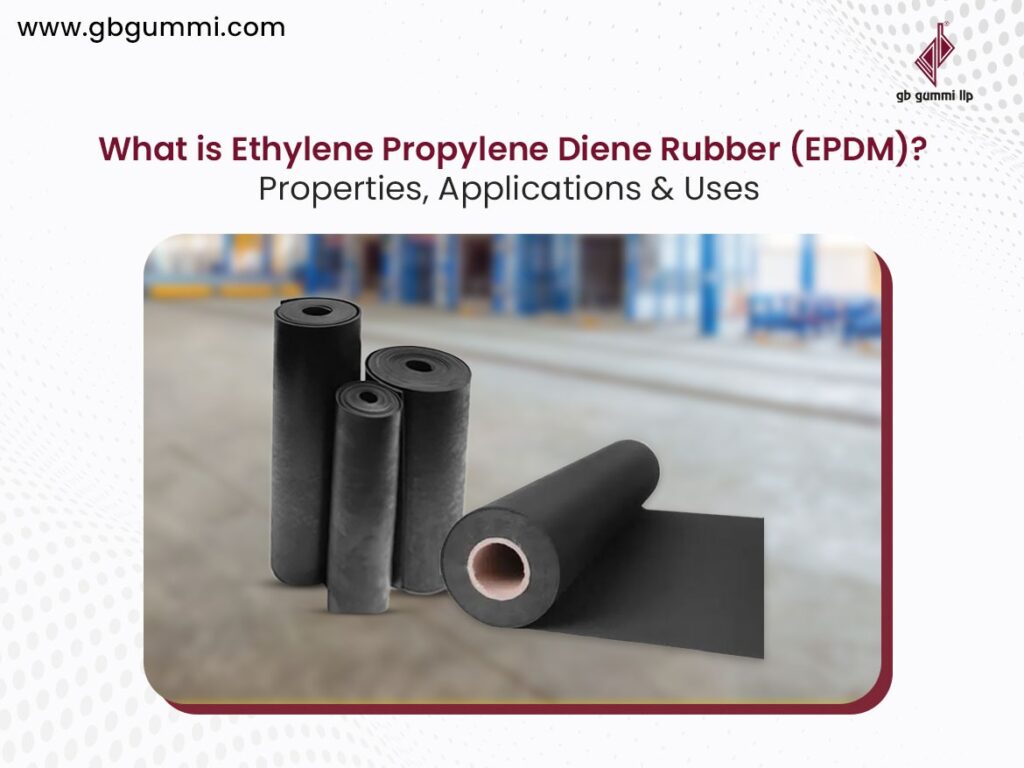Every industry, whether automotive, construction, or manufacturing, depends on durable rubber components. A weak seal or gasket can lead to costly breakdowns, safety hazards, or premature wear. This is where ethylene propylene diene rubber EPDM enters the picture.
Known for its resilience and long-lasting performance, it has become a go-to solution for businesses looking for both reliability and cost-effectiveness.
In this blog, we’ll break down its properties, applications, and advantages so you can make informed choices when selecting rubber materials.
Understanding EPDM Rubber
At its core, ethylene propylene diene rubber EPDM is a synthetic elastomer.
Unlike natural rubber, which is harvested from latex, EPDM is engineered from petroleum-based byproducts – ethylene, propylene, and a diene monomer. This engineered composition allows for precise tuning of its characteristics, making it versatile across different industries.
Under ASTM classification, EPDM belongs to the M-Class rubbers, which are characterized by their saturated polymer chains.
This structural stability gives it excellent weather and ozone resistance – qualities that make it a top performer in outdoor and high-exposure environments.
Key Properties of EPDM Rubber
The performance of EPDM rubber compound can be measured by its mechanical, thermal, and chemical properties. Here are some standout attributes:
- Hardness Range: Between 40–90 Shore A, covering both flexible and firm requirements.
- Tensile Strength: Around 3000 psi, indicating strong resistance to breaking under pressure.
- Elongation at Break: Exceeds 300%, giving it remarkable flexibility.
- Service Temperature: Functions reliably between -50°C and +150°C.
- Resistance: Outstanding against UV rays, ozone, acids, alkalis, and steam.
These properties explain why rubber compound manufacturers in India increasingly prefer EPDM for industries where durability and environmental resistance are critical.
Advantages of Choosing EPDM Rubber
So, what makes EPDM stand out compared to other materials like silicone or natural rubber?
- Weather Resistance: Unlike natural rubber vulcanization products, EPDM does not degrade quickly under the sun, rain, or snow.
- Electrical Insulation: Its low conductivity makes it ideal for electrical seals and gaskets.
- Noise Insulation: Frequently used in automotive settings to reduce vibration and sound.
- Cost-Effectiveness: Despite its premium qualities, EPDM remains competitively priced compared to speciality polymers.
- Versatility: Can be used for seals, hoses, gaskets, O-rings, membranes, and insulation parts.
Applications of EPDM Rubber
The versatility of EPDM is reflected in its wide range of industrial uses:
1. Automotive Sector
From door seals and wiper blades to brake hoses and vibration isolators, EPDM has cemented its role in ensuring both comfort and safety. Its resistance to extreme temperatures also makes it reliable for under-the-hood components.
2. Construction Industry
EPDM roofing membranes are a favourite for their longevity and weather resistance. Window and pipe seals also benefit from its airtight, watertight performance.
3. HVAC Systems
In heating, ventilation, and air conditioning, EPDM is chosen for insulation, seals, and tubing. Its stability against heat and moisture ensures longer-lasting system performance.
4. Manufacturing & General Industries
Rubber compound manufacturers in India supply EPDM components such as diaphragms, O-rings, valves, and gaskets. These are essential for industries ranging from chemicals to food processing.
5. Other Uses
- Insulators for electrical wiring
- Solar panel heat collectors
- Flooring granules mixed with agents for added grip
- Straps, hangers, and vibration control components
Limitations of EPDM
While EPDM is highly versatile, it does have certain drawbacks. Its weakness lies in contact with petroleum-based oils, fuels, and solvents, which can cause degradation. This makes it unsuitable for applications in petrochemical industries unless blended with specialized additives.
Why EPDM Stands Out for Modern Industries
In today’s competitive environment, choosing the right rubber compound can mean the difference between seamless operations and frequent downtime. EPDM offers a unique balance of affordability, durability, and adaptability.
Unlike natural rubber vulcanization, which can be limited in performance, EPDM provides a modern, engineered alternative that meets the evolving demands of global industries.
Partner with the Right Manufacturer
Ethylene propylene diene rubber EPDM has proven itself across sectors for its remarkable resilience, thermal stability, and weather resistance. Whether you are in automotive, HVAC, or construction, this rubber compound provides long-term value.
At GB Gummi, we specialize in supplying high-quality EPDM rubber compounds and other polymers tailored to your industry’s needs.
As one of the trusted rubber compound manufacturers in India, our team ensures you receive not just material, but a solution aligned with your operational demands.
Looking to source the right EPDM products for your business? Get in touch with us today and explore tailored solutions for your requirements.

